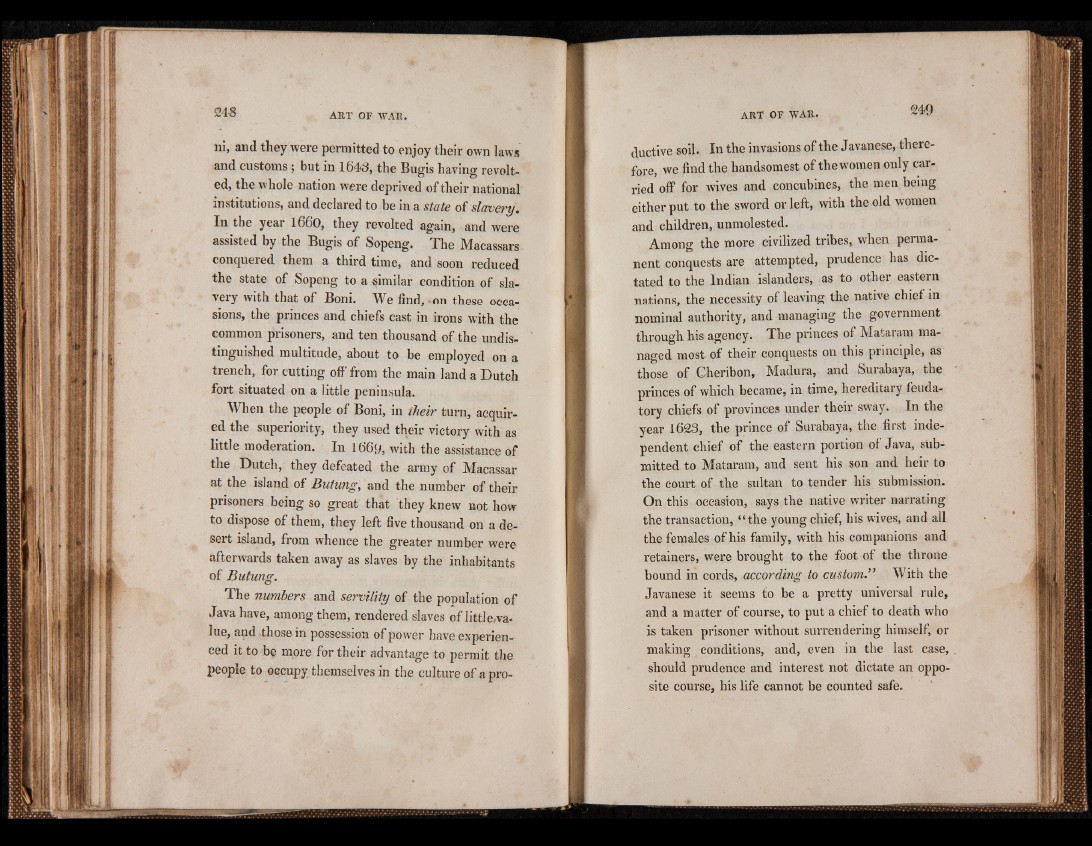
ni, and they were permitted to enjoy their own laws
and customs; but in 1643, the Bugis having revolted,
the whole nation were deprived of their national
institutions, and declared to be in a state of slavery.
In the year 1660, they revolted again, and were
assisted by the Bugis of Sopeng. The Macassars
conquered them a third time, and soon reduced
the state of Sopeng to a similar condition of slavery
with that of Boni. We find,-on these occasions,
the princes and chiefs cast in irons with the
common prisoners, and ten thousand of the undistinguished
multitude, about to be employed on a
trench, for cutting off from the main land a Dutch
fort situated on a little peninsula.
When the people of Boni, in their turn, acquired
the superiority, they used their victory with as
little moderation. In 16*69, with the assistance of
the Dutch, they defeated the army of Macassar
at the island of But wig, and the number of their
prisoners being so great that they knew not how
to dispose of them, they left five thousand on a desert
island, from whence the greater number were
afterwards taken away as slaves by the inhabitants
of Butung.
The numbers and servility of the population of
Java have, among them, rendered slaves of little/va*
lue, and those in possession of power have experienced
it to be more for their advantage to permit the
people to occupy themselves in the culture of a productive
soil. In the invasions of the Javanese, therefore,
we find the handsomest of the women only carried
off for wives and concubines, the men being
either put to the sword or left, with the old women
and children, unmolested.
Among the more civilized tribes,, when permanent
conquests are attempted, prudence has dictated
to the Indian islanders, as to other eastern
nations, the necessity of leaving the native chief in
nominal authority, and managing the government
through his agency. The princes of Mataram managed
most of their conquests on this principle, as
those of Cheribon, Madura, and Surabaya, the
princes of which became, in time, hereditary feudatory
chiefs of provinces under their sway. In the
year 1623, the prince of Surabaya, the first independent
chief of the eastern portion of Java, submitted
to Mataram, and sent his son and heir to
the court of the sultan to tender his submission.
On this occasion, says the native writer narrating
the transaction, “ the young chief, his wives, and all
the females of his family, with his companions and
retainers, were brought to the foot of the throne
bound in cords, according to custom.” With the
Javanese it seems to be a pretty universal rule,
and a matter of course, to put a chief to death who
is taken prisoner without surrendering himself, or
making conditions, and, even in the last case,
should prudence and interest not dictate an opposite
course, his life cannot be counted safe.